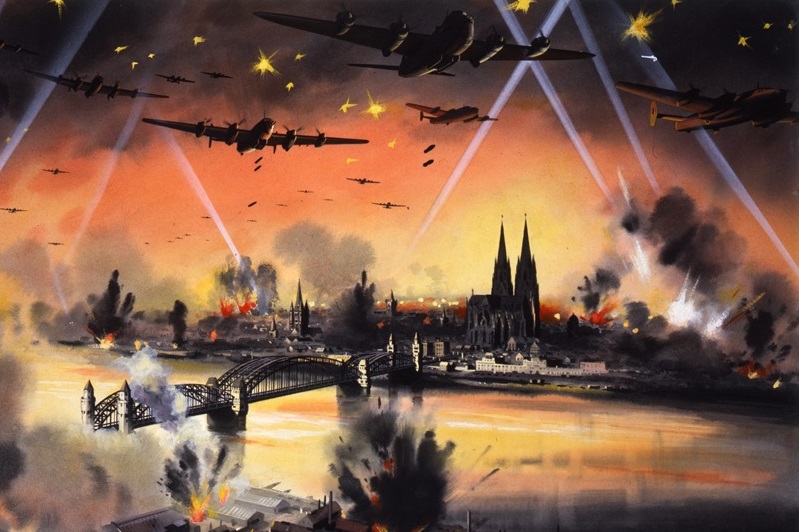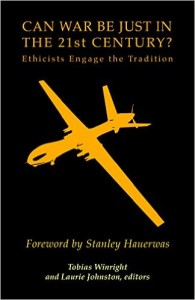
There is a solid rule about what you can expect about reporting on Catholicism: If it’s making the front pages of the news and creating heated debate, then it’s most likely irrelevant and will have no staying power.
The buildup to Amoris Laetitia was bigger than for any of the Leonard vs. Duran fights–Don King be damned. The apostolic exhortation was supposed to tear the very ontological fabric that holds the cosmos together, then the family, and finally, destroy Catholicism along the way by turning it into Anglicanism (I could think of worse scenarios).

Forget Amoris Laetitia. The real battle in doctrinal development is being fought on the Just War front. The story about a Vatican conference highly critical of the doctrine broke about two weeks ago, but pretty much the only person reporting on this momentous development is Joshua McElwee of NCR. Then a couple of other outlets came to the story late and unenthusiastically, then the rest… is silence on the topic.
This then is the big news from the Vatican following a conference on Just War:
The head of the Vatican’s office for peace and justice issues has said it is “plausible” that Pope Francis may write a new encyclical letter focused on reorienting the Catholic church’s teachings on violence, following a period of dialogue and debate on the matter.
Cardinal Peter Turkson, who heads the Pontifical Council for Justice and Peace, added that a proposal made for the writing of such an encyclical by a first-of-its-kind Vatican conference earlier in the month is “very legitimate.”
Why is this announcement such big news? Because Just War has a very, very long legacy in Western Christian thinking:
Just war theory is a tradition that uses a series of criteria to evaluate whether use of violence can be considered morally justifiable. First referred to by fourth century bishop St. Augustine of Hippo, it was later articulated in depth by 13th century theologian St. Thomas Aquinas and is today outlined by four conditions in the formal Catechism of the Catholic Church.
A number of theologians have criticized continued use of the theory in modern times, due to the powerful capabilities of modern weapons and evidence of the effectiveness of nonviolent campaigns in response to unjust aggression.
The Catechism currently outlines as one criteria for moral justification of war that “the use of arms must not produce evils and disorders graver than the evil to be eliminated” and notes that “the power of modern means of destruction weighs very heavily in evaluating this condition.”
Conference organizers say in a note to participants about the April event that just war teaching “can no longer claim center stage as the Christian approach to war and peace.”
The problem is that the theory was supposed to deter war, but in practice it almost always has been used to justify war, and, perhaps most scandalously, the slave trade (yes, you read that right).

This opposition to Just War is not something Pope Francis dreamed up because he is a wild-eyed liberal radical (Benedict XVI better fits that description) that Catholic fundamentalists want him to be. Just like with the death penalty, he is following a fairly consistent developing papal tradition–as McElewee reports:
“We need a new framework that is consistent with Gospel nonviolence,” say the participants, noting that Francis and his four predecessors have all spoken out against war often. “We propose that the Catholic Church develop and consider shifting to a Just Peace approach based on Gospel nonviolence.”
Finally, here is Pope Francis himself, as reported by the NCR, explaining how the consensus against Just War did not emerge via random papal fiat, the development of doctrine just doesn’t work this way, but instead is rooted deeply in Vatican II::
It is also necessary to work together for what persons, families, peoples and nations feel is their right, namely, to participate on a social, political and economic level in the goods of the modern world,” he continues.
“The ultimate and most deeply worthy goal of human beings and of the human community is the abolition of war,” states Francis.
“In this vein, we recall that the only explicit condemnation issued by the Second Vatican Council was against war, although the Council recognized that, since war has not been eradicated from the human condition, ‘governments cannot be denied the right to legitimate defence once every means of peaceful settlement has been exhausted,’” he continues.
As you can see, this statement does not eliminate every possibility of waging limited defensive war, but it rightly puts the emphasis upon avoidance of war, whereas the emphasis has until now been nearly always upon the reckless justification of war. This is a real and significant development in emphasis that significantly changes the application of the theory.
Do you remember what happened around the First Iraq War? The fallout of those wars has boomeranged against the American promoters of a hawkish reading of Just War. The boosters of war were actually not affected primarily (in theory only), however, in practice the decision to go into Iraq is directly responsible for the decimation of the Christian population in a part of the world where it thrived along with other ancient religious traditions for millennia.
It is in great part for these victims of “Just War,” the benefactors of what we callously call “collateral damage,” that the Trevi Fountain in Rome will flow blood red tomorrow:
You will also probably want to know How Did Disappearing Middle Eastern Religions Survive in the First Place?
Stay in touch! Like Cosmos the in Lost on Facebook:
Please also consider making a donation to this blog through the donation button on the upper right side of its homepage.












